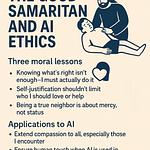Hello, everyone! Welcome to this week’s edition of Shattering Illusions. This week, we cover a recent interview with Peter Thiel in which he discussed artificial intelligence (AI), the tech industry’s ambitions, disillusionment with tech’s progress, and even the Antichrist! The interview hinges on Peter Thiel’s philosophical worldview, which influences everything he says about the pace of innovation in the world. To dive deeper into this and put it in context, I discuss Silicon Valley’s main philosophies and the issues with them, ultimately discussing the Christian worldview as an alternative. Here is an AI-transcribed summary of this podcast with a few modifications:
I. Introduction
This episode of the Shattering Illusions podcast explores Peter Thiel’s recent interview, titled “AI, Mars, and Immortality: Are We Dreaming Big Enough?”, through a Christian philosophical lens. The focus is not on the political aspects of the conversation, but rather on the underlying worldview that informs Thiel’s comments. The discussion aims to uncover how Thiel’s ideas intersect with both the culture of Silicon Valley and broader Christian thought.
II. Key Topics in Thiel’s Interview
Peter Thiel’s interview touches on several broad and influential topics. He discusses the alleged stagnation in technological and societal progress, political figures such as Donald Trump, Elon Musk’s ambitions, and even the concept of the Antichrist. Of particular note is Thiel’s unique treatment of the Antichrist, which diverges from traditional Christian interpretations and reflects his philosophical approach.
III. 7 Radical Silicon Valley Philosophies - A Survey of Philosophical Trends in Silicon Valley
1. Techno-Utopianism
This belief system holds that technology can create a better, even perfected, society. Examples include Sam Altman’s and Dario Amodei’s writings about artificial intelligence, as well as Elon Musk’s vision for colonizing Mars. Many Silicon Valley leaders view their work as transforming the world for the better through innovation.
2. The Singularity
Popularized by Ray Kurzweil, the singularity (at least the intelligence explosion version) is the idea that at a certain point in time, machines will eventually improve themselves at an exponential rate, leading to unpredictable and radical changes in technology that massively change human civilization (or even wipe it out). This includes the emergence of superhuman artificial intelligence (such as artificial general intelligence) and associated risks, such as job loss and the need for universal basic income.
3. Libertarianism
A historically strong influence in Silicon Valley, libertarianism emphasizes freedom from government control. It underpins projects like Balaji Srinivasan’s concept of digital nation-states and is foundational to the ethos behind cryptocurrencies. The philosophy prizes individual liberty and minimal coercion.
4. Transhumanism
Transhumanism envisions a future where human minds can be uploaded to computers, achieving a kind of digital immortality. It suggests that over time, personal identity may dissolve into a collective digital consciousness, moving from cyborg enhancements to fully robotic, digitized minds.
5. Effective Altruism
Rooted in utilitarian ethics, particularly that of the utilitarian philosopher Peter Singer, effective altruism advocates for doing the most good in a measurable, data-driven way. This philosophy supports evaluating the real-world outcomes of charitable acts and is deeply involved in AI safety and efforts at long-term human survival.
6. Foucauldianism (Postmodernism)
Influenced by philosopher Michel Foucault, this perspective treats truth claims as veiled assertions of power. Essentially, claims to truth are considered to be a means of imposing power on others. This view challenges traditional narratives and values by framing them as mechanisms of oppression. This philosophy contrasts with the typically optimistic and future-oriented views of other Silicon Valley ideologies and indeed opposed them directly.
7. Mimetic Liberal Christianity (Peter Thiel’s Perspective)
Thiel’s approach draws on René Girard’s mimetic theory, which emphasizes imitation and scapegoating as fundamental to human behavior. Christianity, in this view, is not literally true but symbolically reveals deep anthropological truths—especially the innocence of the scapegoat, embodied in Christ (indeed, Girard explicitly calls Christianity a myth). Thiel interprets biblical events as mythic representations of these universal dynamics.
IV. Critique of Silicon Valley Philosophies from a Christian Perspective
A. Effective Altruism
While it seeks to maximize good, effective altruism heavily relies on utilitarianism, which becomes impractical when predicting long-term outcomes because we do not know the long-term consequences of our actions. The complexity of measuring future consequences often leads to paralysis and confusion.
B. Singularity & Transhumanism
These philosophies assume that human intelligence is fully computational. However, arguments like the Penrose-Lucas argument suggest that human reasoning exceeds what computers can replicate. If this is true, the ideas regarding the singularity and transhumanism fundamentally misjudge the nature of consciousness.
C. Libertarianism
Though influential, libertarianism is primarily a political ideology. For the purposes of this episode, its political focus makes it less central to the discussion.
D. Techno-Utopianism
This view often mistakenly equates technological advancement with moral progress. In reality, new technologies can worsen inequality or fail to address core societal issues, such as housing or poverty, unless guided by ethical purpose.
E. Foucauldianism / Postmodernism
Postmodernism undermines itself by asserting that all truth claims are merely power plays—yet this very claim is a truth claim. Thus, it is logically self-refuting and lacks a solid foundation for critique or progress. In other words, if there “no truths, only rival interpretations,” then the statement, “there are no truths, only rival interpretations” is not true, but just another rival interpretation, making the statement self-refuting.
V. Deep Dive into Mimetic Liberal Christianity
Thiel’s mimetic approach may appeal to Silicon Valley innovators because it emphasizes the dangers of imitation—a significant concern in a culture that values originality (innovation having an element of originality in it). Thiel’s training as a philosopher also makes it likely that he has distilled and critiqued the other major Silicon Valley philosophies in his own thinking. From a Christian viewpoint, imitation is also morally significant, with scriptures urging believers to imitate Christ and not conform to evil.
However, the core flaw in mimetic liberal Christianity is its classification of Christianity as a myth. Scholars like William Lane Craig argue that the New Testament accounts were written too soon after Jesus’s death to be considered myth (see point 1 in the link). The New Testament writings exhibit the style and detail of historical documents, not symbolic fables.
VI. Broader Critique: Atheistic Materialism & Lack of Purpose
Most Silicon Valley philosophies are rooted in atheistic materialism - the belief that there is no transcendent God (or gods) and nothing in existence apart from physical matter, with human beings consequently being completely made up of physical matter. (Foucauldianism may be a possible exception - still atheistic, but potentially too skeptical of truth to support materialism). These philosophies focus on human progress but ignore foundational metaphysical questions such as, why did the universe begin? Why is there something rather than nothing? If the universe began, does it have a cause? What kind of cause would be able to start the universe? Silicon Valley tends to focus on the anthropological — human and societal evolution — instead of the ontological. Reality is taken for granted, and the focus is on humans’ changes within reality. However, atheistic materialism ultimately renders life meaningless — there is no ultimate purpose toward which to strive. Without an ultimate purpose, there can be no progress because progress implies a direction, which cannot exist without purpose. Discussions of purpose and progress then devolve into discussions of mere personal preferences with no greater significance — once a person is dead, all the “progress” in the world means nothing in an atheistic materialist worldview.
VII. Christian Alternative: Purpose and Progress
Christianity offers both direction and meaning through the belief in God and the historical resurrection of Jesus Christ. Arguments like the Kalam cosmological argument and the contingency argument provide rational foundations for theism. Historical evidence further supports the truth of the resurrection. In contrast to secular philosophies, Christianity offers enduring purpose and hope.
VIII. Conclusion
Peter Thiel’s philosophical insights reveal a deep and thoughtful engagement with modern issues, but they ultimately fall short without the truth of the Christian worldview. True progress requires more than technological power—it requires moral purpose and spiritual grounding. Christianity provides a coherent and hopeful framework in which such progress makes sense.
Please reflect, share, and comment. I look forward to continuing the conversation in the comments. Have a great week.








Share this post